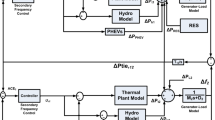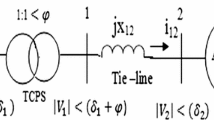Abstract
In a networked distributed power system, even unexpected changes in load can result in significant tie-line frequency and power swings. To prevent this, load frequency management (LFM) is used to keep the frequency and energy output necessary to control tie line power variations between various places, which is the main objective of this work. An essential aspect of LFM is automatic generation control, which governs speed control, so LFM's purpose is fulfilled. In this work, a linked power system is considered, with each location having a thermal and a hydroelectric plant with reheat. Governor Dead Band (GDB) has been applied to each plant to provide a more realistic approach to the system. The proposed controller is the fuzzy PID, fractional-order PID (FOPID) and proportional–integral–derivative (PID). However, it is noticed that the conventional use of PID controller, and FOPID fails to operate correctly, leading to high instability in the power network. Then, FPID with triangular membership is considered, which performed better than PID and FOPID. Here, two robust heuristic algorithms are taken, giving the controller the best gains via teaching learning-based optimization (TLBO) and Differential evolution (DE) with Integral absolute Time-Multiplied Error (IATE) as the primary objective function. Further, performance evaluation of TLBO and DE optimized PID, FOPID and FPID controllers is done. The simulation findings show that, compared to DE-optimized PID and FOPID controllers, DE optimized Fuzzy PID controlling device lessens the frequency shift of the control regions and strengthens the line power. Also, DE optimized controllers give a better output as compared to TLBO tuned ones. MATLAB/SIMULINK has been used to carry out modelling and simulations.


















Similar content being viewed by others
References
O. Elgerd, Electric energy systems theory: an introduction (McGraw-Hill Companies Inc, Estados Unidos, 1982)
A. Mahor, V. Prasad, S. Rangnekar, Economic dispatch using particle swarm optimization: a review. Renew. Sustain. Energy Rev. 13, 2134–2141 (2009)
R. Rao, V. Savsani, D. Vakharia, Teaching–learning-based optimization: an optimization method for continuous non-linear large-scale problems. Inf. Sci. 183, 1–15 (2012)
R. Rao, V. Patel, an elitist teaching-learning-based optimization algorithm for solving complex constrained optimization problems. Int. J. Ind. Eng. Comput. 3, 535–560 (2012)
D. Sambariya, R. Prasad, Power system stabilizer design for multimachine power system using interval Type-2 fuzzy logic controller. Int. Rev. Electr. Eng. (IREE) 8, 1556 (2013)
B. Mohanty, S. Panda, P. Hota, Differential evolution algorithm based automatic generation control for interconnected power systems with non-linearity. Alex. Eng. J. 53, 537–552 (2014)
S.K. Panda, P. Ray, Fuzzy inference model for short-term load forecasting. J. Inst. Eng. (India) Ser. B 103(6), 1939–1948 (2022)
B. Sahu, S. Pati, P. Mohanty, S. Panda, Teaching–learning based optimization algorithm based fuzzy-PID controller for automatic generation control of multi-area power system. Appl. Soft Comput. 27, 240–249 (2015)
R. Sahu, T. Gorripotu, S. Panda, Automatic generation control of multi-area power systems with diverse energy sources using teaching learning based optimization algorithm. Eng. Sci. Technol. Int. J. 19, 113–134 (2016)
A. Jha, N. Malik, N. Kumari, Modified Firefly Algorithm and Fuzzy based FOPID controller for Load Frequency Control of a power system. Int. J. Manuf. Technol. Manag. (2017). https://doi.org/10.1504/IJMTM.2017.1001178
S. Nangrani, S. Bhat, Fractional order controller for controlling power system dynamic behavior. Asian J. Control 20, 403–414 (2017)
K. Bio Gassi, M. Baysal, Analysis of a linear programming-based decision-making model for microgrid energy management systems with renewable sources. Int. J. Energy Res. 46, 7495–7518 (2022)
S.K. Panda, P. Ray, An effect of machine learning techniques in electrical load forecasting and optimization of renewable energy sources. J. Inst. Eng. (India) Ser. B 103(3), 721–736 (2022)
T. Sinha, P. Ray, S. Salkuti, Protection coordination in microgrid using fault current limiters. J. Green Eng. 8, 125–150 (2018)
M. Babu, P. Ray, A review on energy forecasting algorithms crucial for energy industry development and policy design. Energy Sources Part A: Recov. Util. Environ. Effects (2021). https://doi.org/10.1080/15567036.2021.2006370
M. Debnath, T. Jena, R. Mallick, Optimal design of PD-Fuzzy-PID cascaded controller for automatic generation control. Cogent Eng. 4, 1416535 (2017)
H. Hu, Y. Huang, Research of fractional order PID controller using hybrid particle swarm optimization. J. Comput. Appl. 29, 2483–2486 (2009)
Y. Hote, S. Jain, PID controller design for load frequency control: past, present and future challenges. IFAC-Papersonline 51, 604–609 (2018)
J. Bhookya, R. Kumar Jatoth, Fractional Order PID Controller Design for Multivariable Systems using TLBO. Chem. Prod. Process. Model. (2019). https://doi.org/10.1515/cppm-2019-0061
Funding
The authors declare that they have no funding source for doing this research work.
Author information
Authors and Affiliations
Corresponding author
Ethics declarations
Conflict of interest
The authors declare that they have no conflict of interest.
Additional information
Publisher's Note
Springer Nature remains neutral with regard to jurisdictional claims in published maps and institutional affiliations.
Rights and permissions
Springer Nature or its licensor (e.g. a society or other partner) holds exclusive rights to this article under a publishing agreement with the author(s) or other rightsholder(s); author self-archiving of the accepted manuscript version of this article is solely governed by the terms of such publishing agreement and applicable law.
About this article
Cite this article
Lenka, C., Ray, P. & Panda, S.K. Load Frequency Control of a Hydrothermal Hybrid Power System Using Evolutionary Optimization Algorithm. J. Inst. Eng. India Ser. B (2024). https://doi.org/10.1007/s40031-024-01021-2
Received:
Accepted:
Published:
DOI: https://doi.org/10.1007/s40031-024-01021-2




